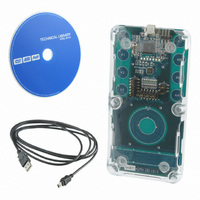ATAVRTS2080A Atmel, ATAVRTS2080A Datasheet - Page 17

ATAVRTS2080A
Manufacturer Part Number
ATAVRTS2080A
Description
KIT QTOUCH W/SW ATMEGA88
Manufacturer
Atmel
Series
QTouch™r
Specifications of ATAVRTS2080A
Sensor Type
Touch, Capacitive
Sensing Range
1 Rotor, 1 Slider, and 2 Buttons/Keys
Interface
Application Programming Interface (API)
Voltage - Supply
1.8 V ~ 5.5 V
Embedded
Yes, MCU, 8-Bit
Utilized Ic / Part
ATmega88
Tool Type
Development Kit
Cpu Core
AVR 8 / 32
Data Bus Width
8 bit
Core Architecture
AVR
Silicon Manufacturer
Atmel
Silicon Core Number
ATmega88, ATmega88A
Silicon Family Name
AVR
Kit Contents
Board, CD
Development Tool Type
Hardware / Software - Eval/Demo Board
Rohs Compliant
Yes
Lead Free Status / RoHS Status
Lead free / RoHS Compliant
Sensitivity
-
Lead Free Status / Rohs Status
Details
- Current page: 17 of 178
- Download datasheet (4Mb)
This feature is useful in cases of high density keypads where touching a key or floating a finger
over the keypad would cause untouched keys to drift, and therefore create a sensitivity shift, and
ultimately inhibit any touch detection.
Setting
Drift hold time
5.3.4
If an object unintentionally contacts a sensor resulting in a touch detection for a prolonged interval
it is usually desirable to recalibrate the sensor in order to restore its function, perhaps after a time
delay of some seconds.
The Maximum on Duration timer monitors such detections; if detection exceeds the timer’s
settings, the sensor is automatically recalibrated. After a recalibration has taken place, the
affected sensor once again functions normally even if it still in contact with the foreign object.
Max on duration can be disabled by setting it to zero (infinite timeout) in which case the channel
never recalibrates during a continuous detection (but the host could still command it).
Setting
Maximum ON Duration
5.3.5
Drift in a general sense means adjusting reference level (of a sensor) to allow compensation for
temperature (or other factor) effect on physical sensor characteristics. Decreasing reference level
for such compensation is called Negative drift & increasing reference level is called Positive drift.
Specifically, the drift compensation should be set to compensate faster for increasing signals than
for decreasing signals.
Signals can drift because of changes in physical sensor characteristics over time and
temperature. It is crucial that such drift be compensated for; otherwise false detections and
sensitivity shifts can occur.
Drift compensation occurs only while there is no detection in effect. Once a finger is sensed, the
drift compensation mechanism ceases since the signal is legitimately detecting an object. Drift
compensation works only when the signal in question has not crossed the ‘Detect threshold’ level.
The drift compensation mechanism can be asymmetric; it can be made to occur in one direction
faster than it does in the other simply by changing the appropriate setup parameters.
Signal values of a sensor tend to decrease when an object (touch) is approaching it or a
characteristic change of sensor over time and temperature. Decreasing signals should not be
compensated for quickly, as an approaching finger could be compensated for partially or entirely
before even touching the channel (negative drift).
However, an object over the channel which does not cause detection, and for which the sensor
has already made full allowance (over some period of time), could suddenly be removed leaving
the sensor with an artificially suppressed reference level and thus become insensitive to touch. In
the latter case, the sensor should compensate for the object’s removal by raising the reference
level relatively quickly (positive drift).
Maximum ON Duration
Positive / Negative Drift
Variable name
qt_drift_hold_time
Variable name
qt_max_on_duration
Data Type
uint8_t
Data Type
uint8_t
Unit
200 ms
Unit
200 ms
Min
1
Min
0
Max
255
Max
255
Typical
20 (4s)
Typical
30 (6s)
17
Related parts for ATAVRTS2080A
Image
Part Number
Description
Manufacturer
Datasheet
Request
R

Part Number:
Description:
DEV KIT FOR AVR/AVR32
Manufacturer:
Atmel
Datasheet:

Part Number:
Description:
INTERVAL AND WIPE/WASH WIPER CONTROL IC WITH DELAY
Manufacturer:
ATMEL Corporation
Datasheet:

Part Number:
Description:
Low-Voltage Voice-Switched IC for Hands-Free Operation
Manufacturer:
ATMEL Corporation
Datasheet:

Part Number:
Description:
MONOLITHIC INTEGRATED FEATUREPHONE CIRCUIT
Manufacturer:
ATMEL Corporation
Datasheet:

Part Number:
Description:
AM-FM Receiver IC U4255BM-M
Manufacturer:
ATMEL Corporation
Datasheet:

Part Number:
Description:
Monolithic Integrated Feature Phone Circuit
Manufacturer:
ATMEL Corporation
Datasheet:

Part Number:
Description:
Multistandard Video-IF and Quasi Parallel Sound Processing
Manufacturer:
ATMEL Corporation
Datasheet:

Part Number:
Description:
High-performance EE PLD
Manufacturer:
ATMEL Corporation
Datasheet:

Part Number:
Description:
8-bit Flash Microcontroller
Manufacturer:
ATMEL Corporation
Datasheet:

Part Number:
Description:
2-Wire Serial EEPROM
Manufacturer:
ATMEL Corporation
Datasheet:












